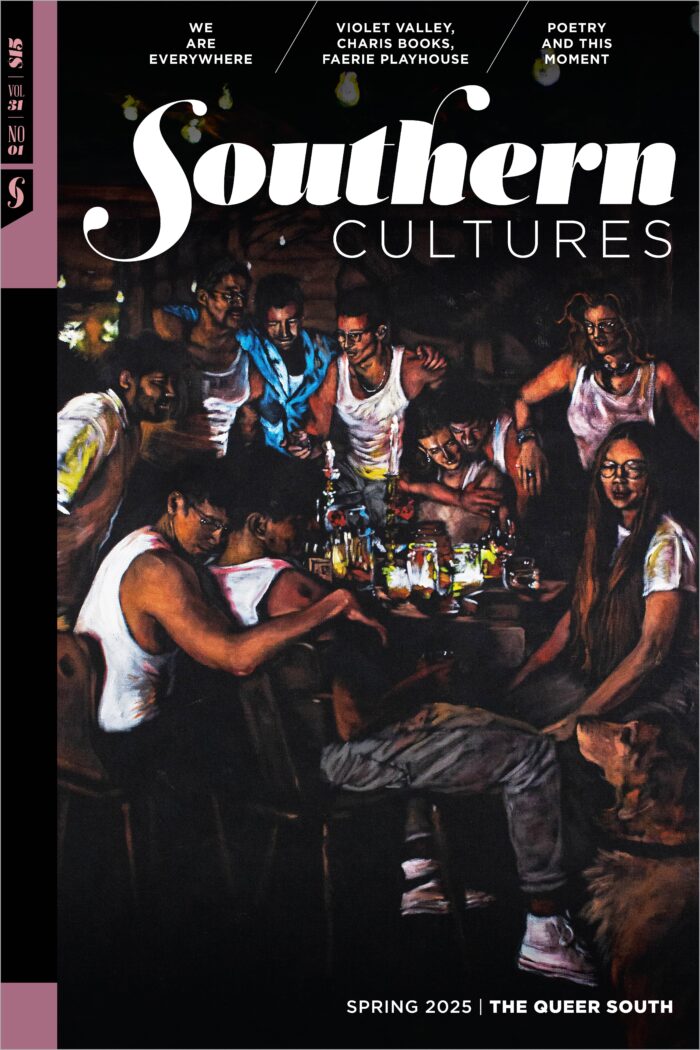Welcome to our virtual book tour. Since so many literary events have been canceled or postponed during the pandemic, we’re bringing authors directly to you. We hope you’ll get to know a writer or book to add to your reading list. We also encourage you to support your local bookshop.
Michael Croley’s collection Any Other Place: Stories (2019) explores alienation and desire in the small town of Fordyce, Kentucky. For this leg of our Book Tour, Belle Boggs, author of The Gulf and The Art of Waiting: On Fertility, Medicine, and Motherhood, chats with Croley about home, parenthood, and the importance of daydreaming. The two spoke in June, shortly after the tragedy of George Floyd, and the upheaval around the country in support of Black Lives Matter.
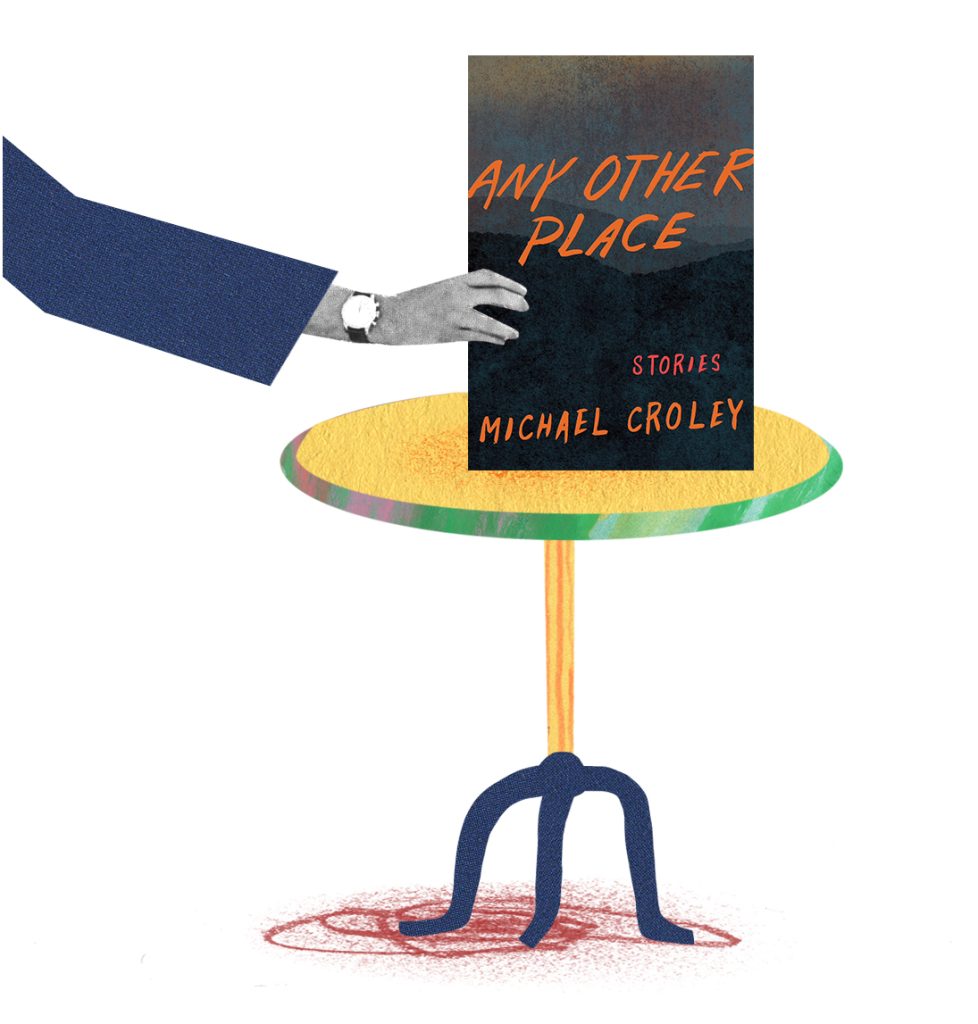
Belle Boggs: Hello, Mike! We’re speaking at such an extraordinary time—during a global pandemic that makes it hard to imagine what university teaching will look like in August. It’s also a time of reckoning with anti-Black violence after the murders of George Floyd, Breonna Taylor, and Ahmaud Arbery, and police violence against peaceful protestors. How are you, your students, your family?
Mike Croley: Hi, Belle. At home, we’re struggling with the mess of COVID and grateful our children are young enough we can shield them from these tumultuous times. My students are struggling to come to grips with the violence in this country, it seems to me. I think the current generation—and maybe every generation—gets picked on way too much for what appears to be flippant behavior. But I’ve been teaching 17 years and I have to say each generation of students, to me, seems to be more aware of the social injustices in this world. They’re certainly more attuned to them than I was, which isn’t some great feat, but it’s heartening as a teacher of young people to see them not just embracing social change, but advocating for it.
Belle Boggs: I agree, and I’m grateful to know the graduate and undergraduate students in our program, who are so compassionate and honest and brave in the ways they approach social justice and each other. I’m inspired by them. Has 2020—all of these events, plus the upcoming election—changed you as a reader? As a writer? A teacher?
Mike Croley: What a tough question, but it’s a tough time. I definitely think a lot of things have changed for me with what’s happened this year. I think I was already changing my reading habits in the last few years, but I’ve really committed myself to reading more writers of color, more women, and more women of color. When I was beginning to be a writer I wanted to write about the kind of men I had grown up around. These were men, in some instances, I admired and, in others, I abhorred. But as I’ve gotten older and my own vision of the world has expanded it’s made me reconsider my reading habits and how narrow they were for a long time. Even as a person of color, I think I put myself in a narrow box of what I could write about and that put me (wrongly, of course) on a narrow reading path as well. So as a teacher, I’m trying really hard to teach the breadth of human experience, too, and trying to be a model of ignorance, often, to create a safe space for students to enter into communities through literature they’re unfamiliar with.
Belle Boggs: So many of your stories explore displacement and the mixed feelings of a desire for a return home. These were ideas that already resonated with me as someone who also grew up in a rural place. My parents live in a town of less than one hundred people. I grew up in a county with no bookstores, no large or accessible public library, things like that, and my parents still live there—they don’t even have Internet access where they live. So I was thinking, as I was rereading your book now, how so many of us are literally isolated and we cannot safely go home to the places we grew up. I don’t mean to suggest that you’re sitting around rereading your stories . . .
Mike Croley: All the time.
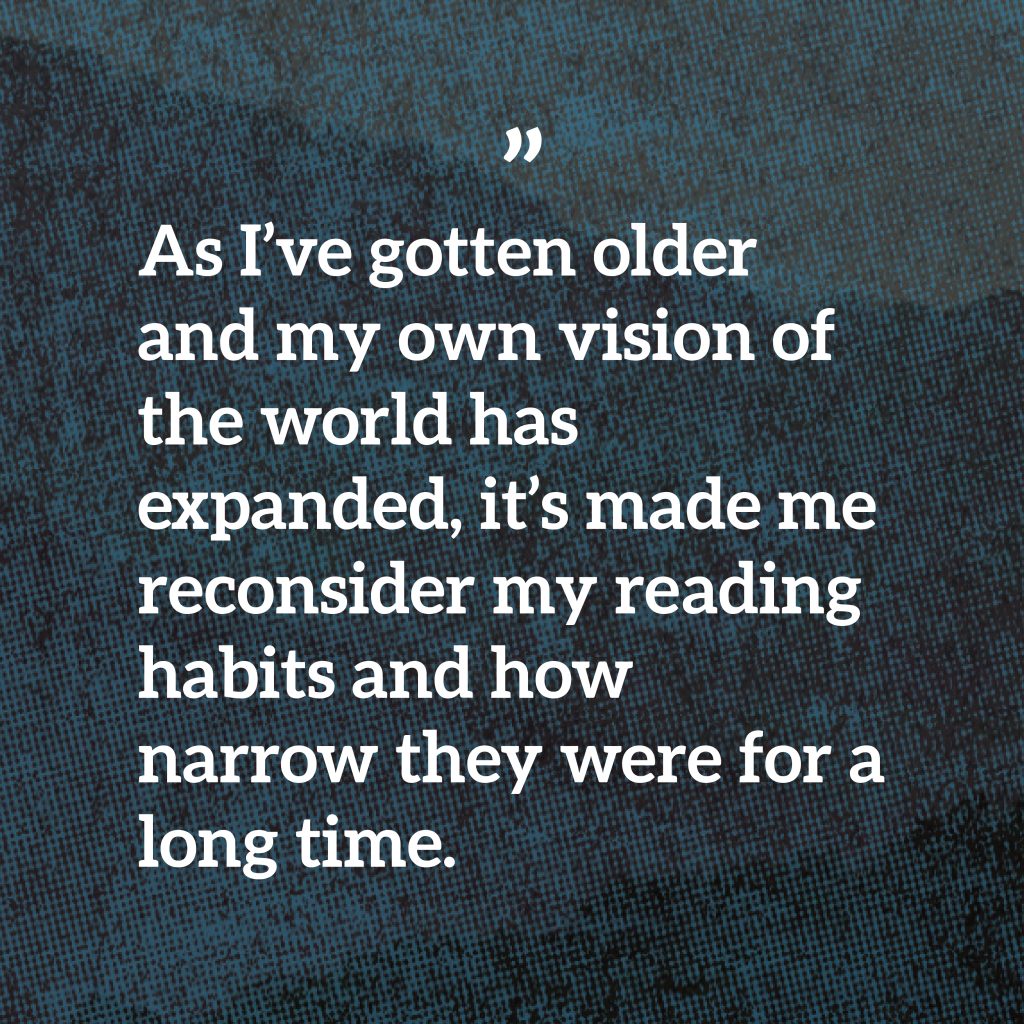
BB: I imagine you at least think about the places in the stories since place is so important to you.
MC: I guess I have thought about it. Maybe not in that way, but I have thought a lot about how different it would be to be isolated where I grew up in Corbin [Kentucky]. I think about my folks there. It’s a bigger place than where you’re from—7,500 people or so. We always used to joke that Corbin was so big it sat in three counties, but that was just some sort of weird annexing process that went on.
I worry about it a lot. My dad goes to the grocery store, he puts a mask and gloves on. He’s the only one that does it most times when he’s there. Same thing for my mom. I think about those things, which is also happening where I live now in this little town in Ohio. But I think about it there because it weirdly reinforces how I always felt like an outsider. And I think definitely how my mom always felt like an outsider—obviously ethnically, but even, I don’t know if educationally is the right way to put it. I don’t mean—that sounds kind of snobbish when you say it that way—but I think, just, we were always kind of outliers.
And, so I think about how difficult it is to sort of already feel like you’re on the outside of a place and then to be pushed outside another level. You know what I mean? When you think about the ways in which perhaps you are taking this pandemic seriously versus the ways in which other people may not see it as seriously as you do, it kind of reinforces that you’re not part of the larger place.
BB: It does . . . There’s this moment that I loved in [your story] “Smolders” when Wren has just graduated and he wants to say to his friends, “if these are the best days of our lives, our lives are really going to suck.” I remember thinking that same thing as a teenager, but I thought it was so interesting that he wants to say it but doesn’t. He also has this yearning for home and this yearning to be accepted at the same time. I thought that was so beautifully evoked in this story, [and also], throughout the collection, the sort of mixed feelings that people have about when they are not fully accepted—whether it is because they’ve had an opportunity to move away or because of racism.
I know that the town [in the collection] is sort of a created town. But in other places you have written about your town having a racist past. I thought that you did a beautiful job of showing the impact of feeling like an outsider and yet also having certain opportunities. That balance you strike within the collection resonated with me personally as somebody who [has lived] in a rural place where I felt . . . a little bit different. We didn’t go to church and had different sort of . . .
MC: You didn’t go to church.
BB: And I was going to go to hell for that, according to my best friends in elementary school. Anyway, I just love the way that you have evoked those complicated feelings. How do you relate to Corbin now?
MC: I have very complicated feelings about it. The reason I am able to give [the town] a lot more texture has a lot to do with being an athlete growing up there. I guess, in a way, I knew it was weird when I was growing up to be half Korean and to be there. But I also am always kind of careful to not overstate that too much. It didn’t occur to me how weird it was to other people until I moved away. They would come up and [ask], “Where are you from?” And you tell them, and then they would go, “Oh, what’s that like?” Just the tone of their voice started making me think, well, maybe that was pretty weird. But because I played sports, I was on the inside. That was everything in our hometown. I mean, being an athlete was a really big deal. It’s like that in most small towns I know. My brother had been an athlete and . . . I just wanted to be like him. That was all I really cared about.
I was a good athlete for a small town, which doesn’t really mean a lot, I don’t think. But I was a hard worker. I was a smart kid. I got by. What I lacked in athletic ability, I made up for in smarts when I played sports. Most of my coaches really liked me. And I think because of my mixed ethnicity, I had a different worldview. I was a lot more mature than most kids are at that age because I had a mom who was from somewhere else. I had a mom—like, you watch the evening news and your mom would give you this perspective on the world that no one else’s mother was giving them. I remember we had a basketball trip my sophomore year where we flew on a plane to Florida to play in this tournament. And of 16 guys on the team, only three of us had been on a plane before, or maybe a little bit more, but it wasn’t half.
BB: Oh yeah, when we went on field trips, we would go from my elementary school sort of successively farther and farther away. And by the time we got to Richmond, which is an hour from where I grew up, there were a lot of kids who hadn’t been. It was a really big deal [to be] on a charter bus. And I think about that a lot and what that means.
MC: Yeah. So in a way, I resided in one power structure. A lot of people could have seen me as this sort of successful jock. I would not characterize myself that way, but let’s just say that’s the pot I was thrown in. I could occupy that. I grew up in locker rooms and frat houses with these . . . unwritten rules of masculinity.
But on the other hand, I grew up with the sense of not having any power, too, of being an outsider and not feeling like I fit in and sort of questioning people’s motives—having racial slurs thrown at you the minute something went sideways, sort of consistently feeling downgraded where we lived and where we grew up. And those things happened to my brother, too, and he took a lot more lumps than I did. So by the time I came through, he was six years older, everybody knew us. So it was a little bit easier, but it wasn’t.
BB: And he was athletic also?
MC: Yeah. He played sports and, particularly like with coaches and stuff, my mom was very vocal. You know, she took up for us a lot. She’s very headstrong. And my dad was the guy that worked really hard all the time. He’d sort of worked his way up as an executive in this local company. He’d grown up very poor. And my mom had grown up very poor. I think for people like that, their biggest fear is that they’ll lose it. So my dad was just an animal. 80, 90 hours a week at the office. I think he liked to work, but I think he was driven by this fear that he could lose things, too.
So my mom would do both parenting roles a lot of times. She would talk to coaches. She’s got this great Korean accent with all these hillbilly idioms. But that’s a tough position for a 35-year-old woman with two small kids to have to do sometimes in a town full of, at that time, certainly more bigots than there are now. I look back on that a lot and think about how strong she was to get through all that.
BB: I know that people have asked you about your representations of masculinity, and you mentioned representations of masculinity earlier in the conversation, or thinking about what it is within this particular community to what ideas of manhood looked like, or what was expected of men and of young men. But there’s so much tenderness to many of the men in the stories, too, and even different approaches to struggles and challenges that are surprising within those communities.
MC: Right.
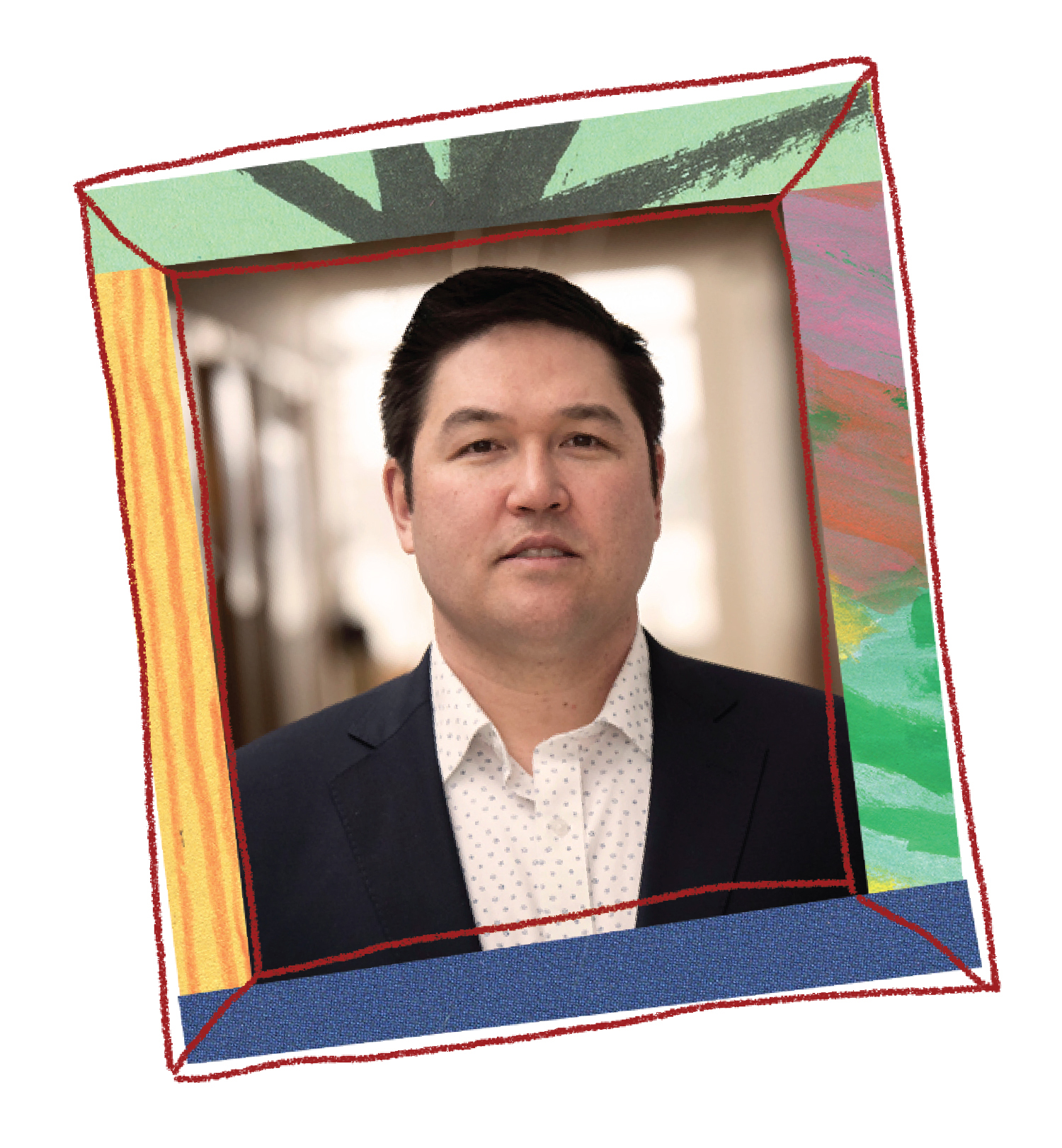
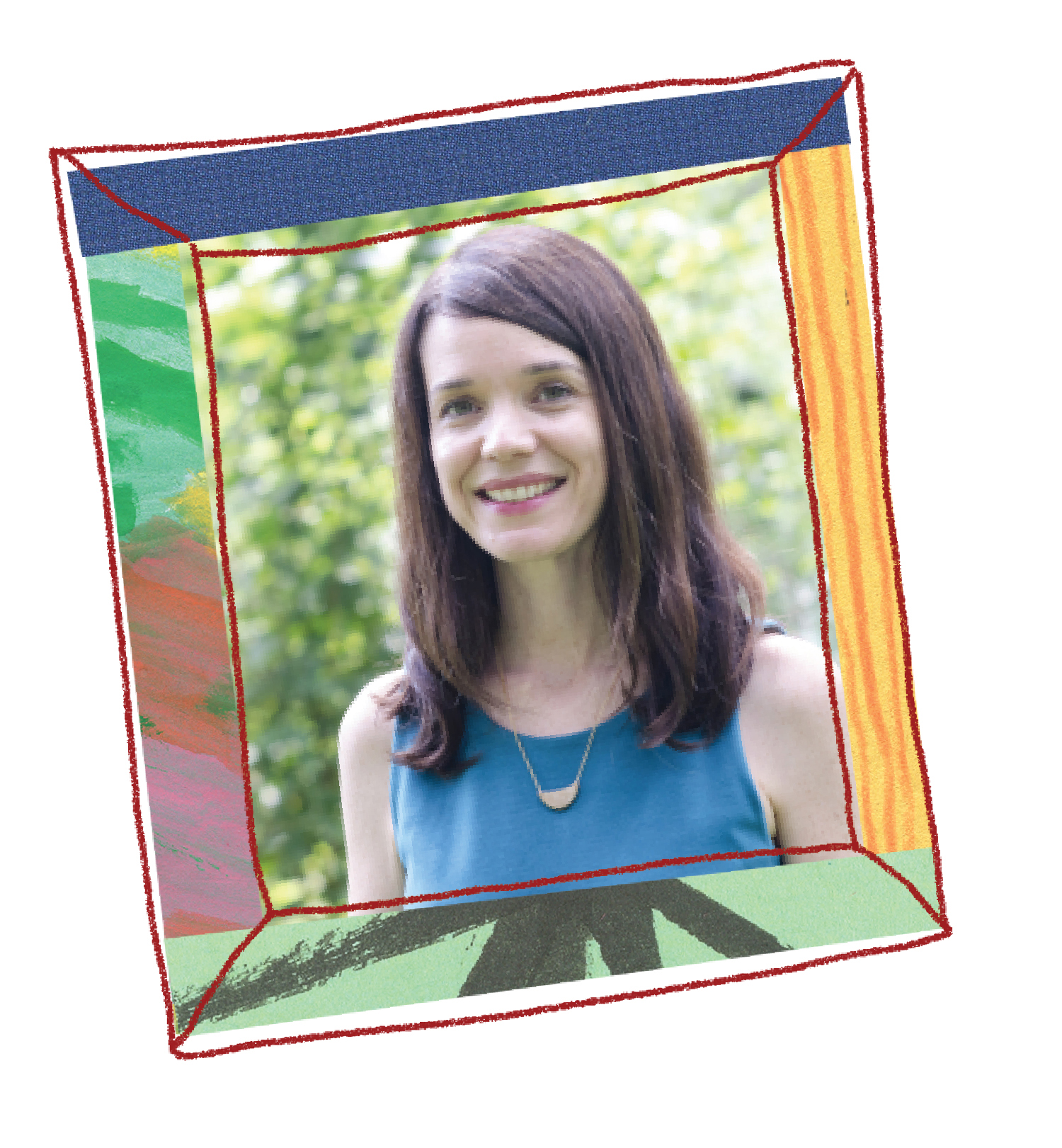
BB: Or within what we think of as that kind of southern Appalachian, small-town community. I also wanted to talk about the story “Since the Accident.” I love the way that this story works with masculinity and the way that it defamiliarizes infertility in a way, and then surprises us again with a different kind of reveal about what’s actually happening—it made me think of the concept of social infertility, which is an inability to conceive because of a broader, not necessarily biological condition or illness. If you want to have a family but are afraid to conceive—because of poverty, fear about the climate crisis, or some other reason, you could be considered infertile according to this way of looking at it.
Early in the story, Emma’s husband Richard asks her about seeing a fertility doctor. I think it’s a little bit unusual that he’s the one to bring it up. He brings it up in a very gentle way, and then he also says that it might be an issue with him. And it’s very unusual to see men in this role within our culture, but in fiction especially. I appreciated that a lot as somebody who thinks and writes about infertility, and who experienced it myself. And then we learn later in the story of the surprise, which is that she’s gone back on the pill because she had so much anxiety caused by a near-death crash, and the experience of seeing somebody die.
That may align with a lot of people’s experiences these days, right? How do we feel secure in having kids when we’re faced with the terror of the world, the injustice of the world, the uncertainty of the world?
MC: I really appreciate these insights you bring to the stories because I didn’t know it was odd for a man to bring that up when I wrote it. I just felt like [the character Richard] really loves his wife. He really wants to have kids. In my mind, he knows that she’s gone through this terrible thing. He knows that it’s hard. He also is aware that there’s something between them. You know that something has come between them, but he loves her and he wants to be gentle about it.
And I do think he really thinks, “What if this is my problem, what if I’m the reason we can’t do this?” And so she feels this tinge of guilt when he says that, because I think she knows that he’s a good person. And I think I still do this in my own life, but I’m sort of interested in these . . . I guess, I’m sort of interested in these kind of lovable meatheads that don’t really know how to articulate exactly what they’re feeling.
I always tell my students I’m a recovering meathead, because it’s kind of true. I was a sensitive boy when I was growing up. But also I had grown up in this world, and was encouraged by my mother even, to be very masculine in what we might consider that traditional sense. [M]y mom and my dad, but my mom even more so, was the kind of person that if you came home and someone had picked on you, then you were going to go back the next day and stand up for yourself. You know?
BB: Yeah.
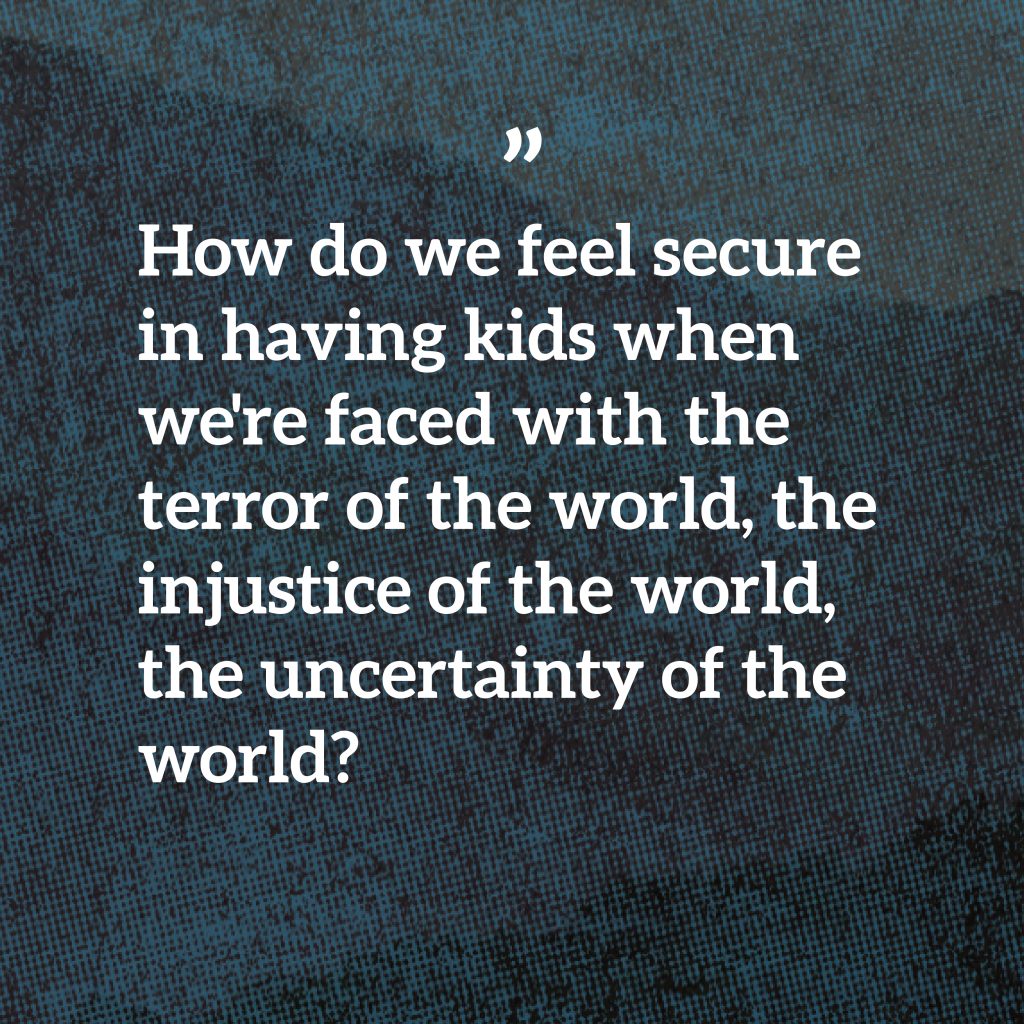
MC: I think [that’s] because her experience when she came over was not particularly warm and inviting. She felt like you had to be very hard to get through this world. And she imparted that to both of us. I would go out every weekend with my father to this cabin he had built with his brothers, and I’d be around my cousins and my brother. And we would do very typically boy things. We’d run through the woods with 22s hunting squirrels, or doing target practice, or just whatever.
But I never really enjoyed that stuff. I mean, one of the strongest memories I have of that is I liked playing sports, so I liked when we played basketball out there. But I also remember always feeling really bad because we would leave my mom behind for two days. And I always missed mom while we were there. I always felt bad that she wasn’t with us. But I also did not want to miss out on the time with my brother and my dad.
We would always come back on a Sunday near dusk, and it was about 45 minutes from where we grew up, and I would sit in the middle of the truck and I always fell asleep between one of them, leaning on either my dad or my brother.
One of the few talents I had as a young writer was that I had this insight that most of us aren’t male or female in our feelings. We’re just human beings that have these longings. And I thought if I feel this way, there’s got to be other guys out there this way that just can’t access it. So I tried to make Richard someone who has access to it a little bit.
BB: And representation is important. The craft of the story is also beautiful, the way that it reveals that there’s something else at the heart of Emma’s decisions, and it just has this really nice patience to it. Your stories have a lot of patience to them.
MC: As I got older, I started thinking about the ways in which small towns, and not just small towns, but the ways in which the world really sort of hems women in that way. So I became really interested in making the town a character.
It’s kind of interesting thinking about these stories pre-COVID and post-COVID but, for me, it’s really interesting to think about the stories in a world where Donald Trump, as our president, projects this false masculinity. I’ve thought about this over. I mean, there’s not a day that goes by that you’re not allowed to think about something stupid and ignorant that he tweets. On Facebook the other day this guy that I’ve known, my whole life said, “I think Trump’s the man.” I’ve known him so long that I’m not going to get into an argument or debate with him, certainly not on Facebook, but not even face-to-face.
But one of the things I’ve been struck by is the ways in which, where I grew up, Trump was the kind of guy that nobody would’ve respected. He’s all bark and no bite. He’s the kind of guy—if he had been on the football team or had been on the basketball team with us—nobody would have listened to him, nobody would have respected him because they know that he’s not really tough. I just think it’s so interesting. He’s lazy, he doesn’t work hard.
BB: Privileged.
MC: Yeah, where I grew up, he’s all the things that we made fun of, and I’m talking about on the football team. He’s soft, he runs his mouth all the time, he can’t back it up, the minute he would get hit on the football field, he would cry and say he’s injured and limp off the field.
BB: What does Tammy Duckworth call him, Cadet Bone Spurs?
MC: Cadet Bone Spurs, right. We would say he’s all those things. I mean, there was nothing worse when I was growing up than to be called soft and to be called gutless, and that’s exactly what he is, and yet I find it interesting, and I mean that in the truest sense of the word. I find it interesting that these guys that imparted these values to us, and that we embraced growing up, that a large majority of men that imparted those kinds of values of toughness and doing what’s right and sticking by your teammates, this guy doesn’t have [them]. And so then you’re left to wonder. It’s sort of like this melodrama of my childhood is playing out again in a weird way that I don’t understand, and yet I also completely understand . . .
It’s a weird world. So I wanted to ask you a question. It’s one parent asking another parent for advice. How do you do all this and raise your kids? How do you write and teach?
BB: I was going to ask you the same thing, Mike.
MC: Because I don’t know how to do it.
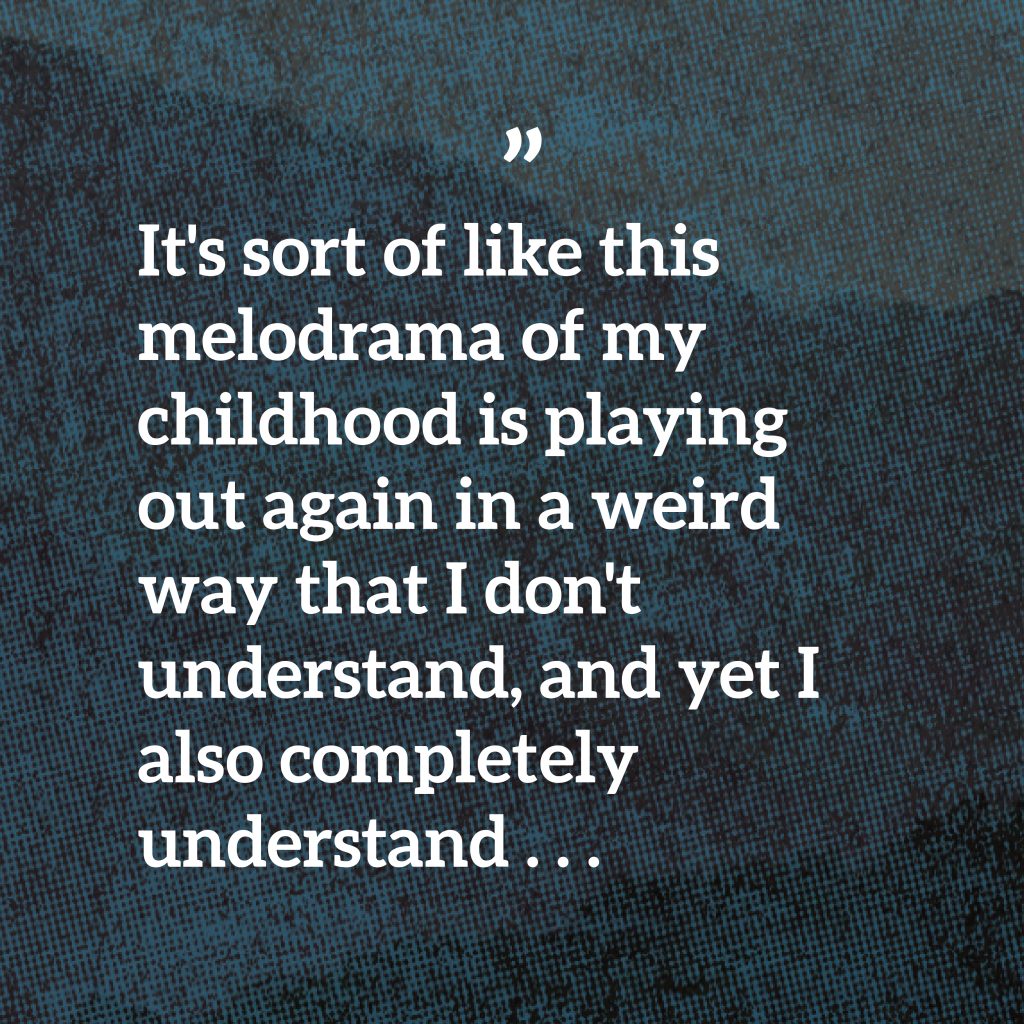
BB: Honestly, I’m always OK to talk about that . . . because I feel like the economic burdens on parents, the lack of options even before all of the shutdowns, the lack of affordable childcare that is of a high quality . . . The first Elizabeth Warren ad that just made me cry was the one where she talked about almost having to leave her career because she didn’t have childcare she could trust or [a place] where she felt safe leaving her kids.
I mean, luckily, before this shutdown we had found a really great place for our younger daughter, but still, that struggle and then the fact that artists are expected to produce artwork, what, in our heads? It’s really hard. I’m privileged to work in a university that values my [creative] writing as part of the time that I’m supposed to spend writing and researching. And as someone who worked for years at K-12 schools, I feel so lucky every day that I have the opportunity to do that. But it’s still difficult and only getting more difficult, with the pandemic.
MC: It’s a lot of mental stress, and the reason I wanted to ask you about it was because I don’t think we talk about enough. I phrased my question the way I did because it is often posed to female writers. Like that essay in The Paris Review recently, about the woman who went on the market. I forget the name of it, I think it was “Fuck the Bread“?
BB: Yes, I did!
MC: That piece resonated with me, but obviously not in the same ways because I know that women are marginalized in so many ways on the academic job market. No one has ever asked me in a job interview, “Who’s taking care of your kids right now?” I do feel those stresses, and I even talked to you about it in January, too, just because I’m trying really hard to figure out the balance. My dad was the kind of guy, like I said, who worked way too much, and my mom took care of us. It was very traditional in that sense, but my mom went to college and entered the workforce for a few years before stopping again to come home and take care of us again. My wife has been able to do that for us, but it’s not easy because I don’t leave for that many hours a week. I was gone a lot during book tour, so she might disagree with me on that, but I try to be home, and I try to not be that kind of parent. I want to be good and present at both work and at home.
I think it’s kind of funny the way that our country is set up—it divides our country in another way. Those of us that are parents, and those of us that are not parents. And you don’t really understand the stresses of daycare, and child care, and the stress that puts on a family if you don’t ever have to deal with them.
There’s no compassion or empathy about how difficult it is, even at really well-meaning places like universities. I don’t have any answers, but I think I just sleep less is how I do it. If I’m going to write, I have to sleep less.
BB: I think you cut back on other things. Other things you might do feed yourself. I talked recently with another writer friend, who also has two little kids, about the essentials, what we had to do, and we listed them. I’ve got to work. I’ve got to write. I’ve got to take care of my kids, and get some exercise to feel mentally healthy, and I don’t remember, maybe there was something else on there, too. But we both thought we could only do three of the four things at a time.
Actually, lately what I’m doing is—we’re really lucky to live somewhere where we can hike a lot and go to the river. The river’s really high right now. We can’t get close to it. We can get to a stream, but I assume later this week it will be low enough that we can go wade in the river.
MC: There you go.
BB: I try to give myself a little time to just space out and think. When I used to make my long commute to work, before we were teaching online, I would think about what I was going to write next when I was in the car and kind of daydream.
I say this as a lucky person. Lucky to have more than four daycares in my community, a good public library, lucky to have a job and health care and space to roam around in. I have more time than a lot of people, but it’s not enough, and so if it’s not enough for me, it’s really not enough for a lot of other people who have things to say, and who need to be heard by other people. It is just deeply frustrating.
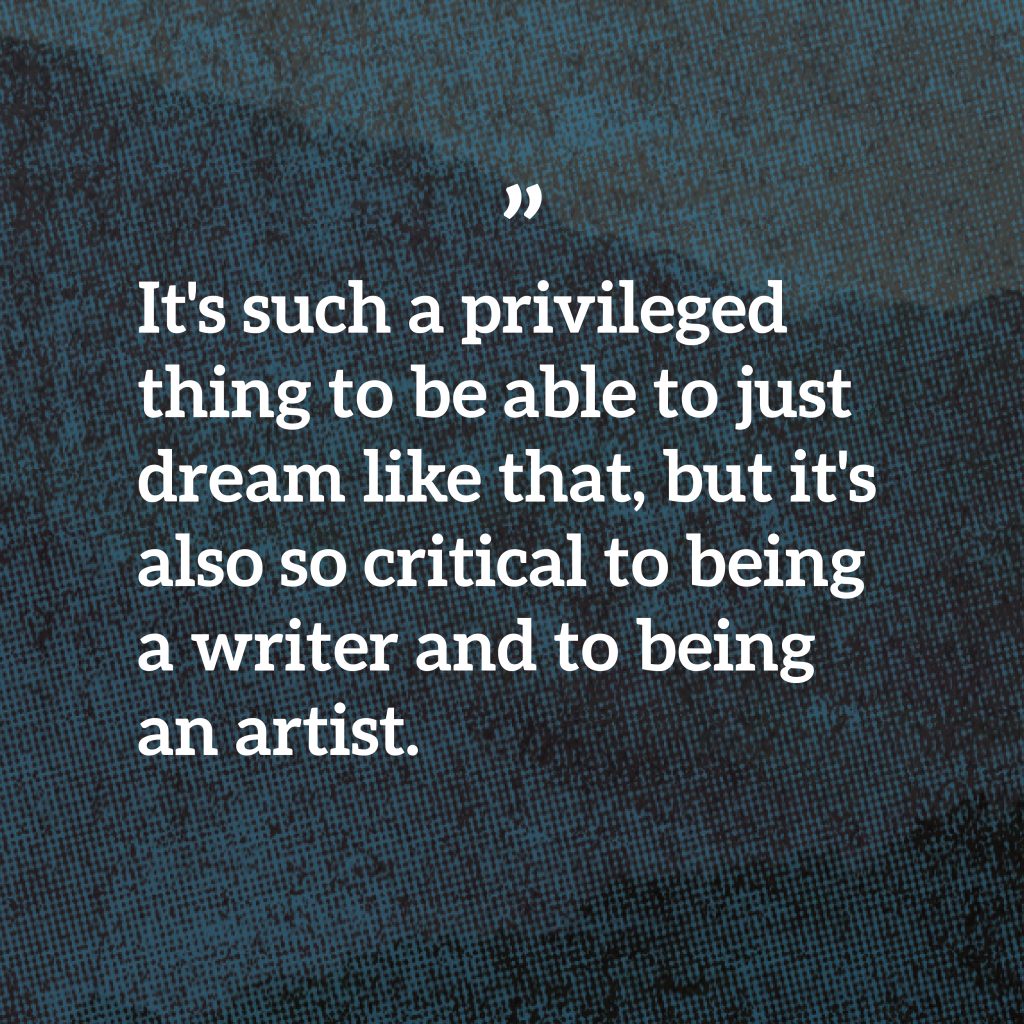
MC: The daydreaming is so important. The ability to just go into your head and space out a little bit. For me, sometimes I am just spacing out, but a lot of times it’s how I’m going to come up with ideas, and I’m thinking through difficult plot points, or thinking about what’s not working in the story, or dreaming up what the next story is going to be. It’s such a privileged thing to be able to just dream like that, but it’s also so critical to being a writer and to being an artist.
BB: Yet, I think we all need time to daydream, right?
MC: Right.
BB: We all need that time to be able to think about more than the bills, and where we’re going to get our next giant pack of toilet paper, and what new disaster has happened in the hour you spent not paying attention, and the other stressful things that we’re trying to think about now. The terrible, brutal news intrudes on the daydreaming.
Visit your favorite bookshop online or find works by Croley and Boggs directly via the following links: Any Other Place: Stories (Croley), The Gulf (Boggs), The Art of Waiting: On Fertility, Medicine, and Motherhood (Boggs).

